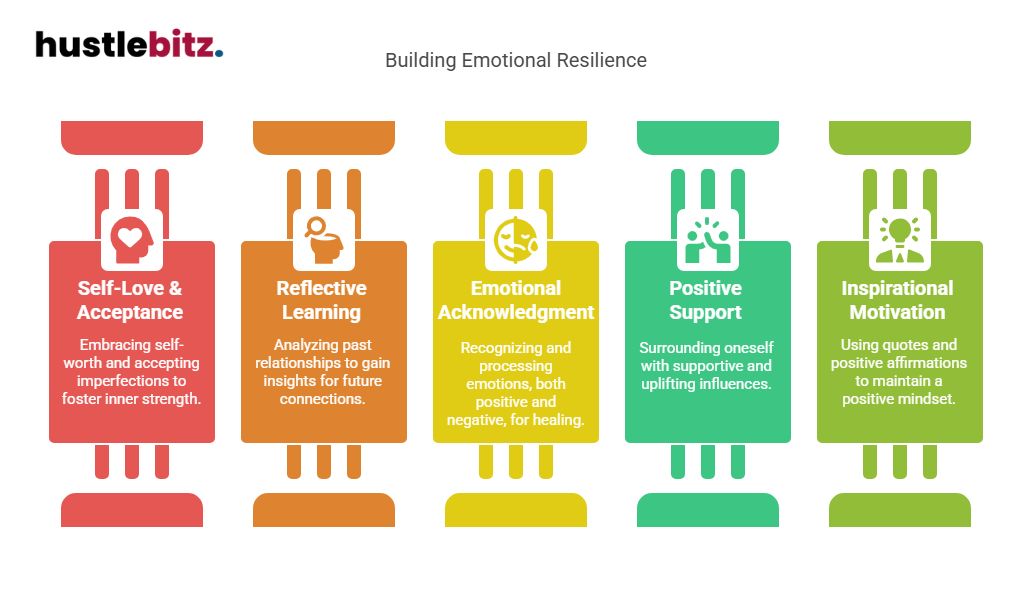Breakups can be painful but also serve as vital opportunities for growth. Embracing positive quotes can inspire healing and resilience. For instance, Robert Holden reminds us that our relationship with ourselves shapes all others. J.K. Rowling emphasizes how hitting rock bottom can lead to rebuilding one’s life. Other quotes encourage self-acceptance, personal strength, and the importance of standing firm in one’s beliefs. These reflections nurture emotional resilience, guiding you through the healing process. To further enrich your journey, a collection of ten uplifting quotes awaits, each designed to illuminate the path toward emotional recovery and renewed strength.
Key Takeaways
- Embrace self-love and acceptance to rebuild your emotional strength after a breakup.
- Reflecting on past relationships can reveal important lessons for future connections.
- Acknowledge your emotions; healing requires facing both joy and sadness.
- Surround yourself with positivity and support to foster resilience and growth.
- Use inspirational quotes to motivate yourself and maintain a positive mindset during tough times.

1. “Your relationship with yourself sets the tone for every other relationship you have.” — Robert Holden

The foundation of any healthy relationship begins with the way we perceive and treat ourselves, as emphasized by Robert Holden’s insightful quote.
Our relationship with ourselves is a mirror reflecting how we interact with others. Engaging in self-love practices is crucial for nurturing this internal relationship, as it fosters a sense of worthiness and acceptance. By prioritizing self-compassion, we lay the groundwork for personal growth, allowing us to evolve and develop emotional resilience.
Embarking on a self-acceptance journey involves recognizing our strengths and vulnerabilities, ultimately creating a balanced view of ourselves. This acknowledgment not only enhances our self-esteem but also empowers us to rebuild trust—both in ourselves and in future relationships.
Trust is a vital component of any connection, and when we learn to trust ourselves, we become more capable of extending that trust to others.
Moreover, engaging in self-love practices can significantly impact our emotional health. By cultivating positive affirmations and setting healthy boundaries, we fortify our emotional resilience, equipping ourselves to handle challenges with grace.
As we navigate through life’s complexities, it is essential to remember that our ability to love and accept others often mirrors the love and acceptance we extend to ourselves.
2. “I’m going to smile and make you think I’m happy, I’m going to laugh, so you don’t see me cry, I’m going to let you go in style, and even if it kills me – I’m going to smile.” — Lone Star

Lone Star’s poignant quote encapsulates the complex interplay of grief and resilience that often accompanies a breakup, highlighting the facade of happiness that many wear in the face of emotional pain. This sentiment underscores a common experience: the struggle to maintain a brave exterior while grappling with profound inner turmoil. The act of smiling, even when it feels insincere, can serve as a coping strategy, allowing individuals to navigate social interactions without revealing their vulnerability.
In the journey of self-discovery that follows a breakup, emotional resilience becomes paramount. Embracing the duality of happiness and sadness can lead to a deeper understanding of oneself, revealing inner strength that may have previously gone unnoticed. Recognizing the necessity of both emotions is a crucial aspect of healing, as it allows individuals to process their experiences fully.
Moving forward after a breakup requires the implementation of healthy coping strategies. These may include journaling, engaging in physical activity, or seeking support from friends and loved ones. Such practices not only provide an outlet for emotions but also promote personal growth.
Ultimately, while the facade of happiness might serve as a temporary shield, embracing vulnerability can lead to authentic healing. As individuals confront their feelings and allow themselves to grieve, they lay the groundwork for a more profound sense of resilience and self-acceptance. Thus, the journey toward healing is not just about putting on a brave face, but also about cultivating the strength to face one’s true emotions head-on.
3. “Pain is inevitable. Suffering is optional.” — M. Kathleen Casey
Embracing the notion that ‘pain is inevitable, suffering is optional’ invites individuals to acknowledge their emotional experiences while maintaining the power to choose their responses.
This perspective encourages emotional resilience, allowing individuals to navigate the tumultuous waters of a breakup with a mindset geared towards healing and growth. It emphasizes that while pain is a natural part of life, especially in the context of loss, how one responds to that pain is within their control.
This insight can serve as a foundational element in a self-discovery journey. To foster personal growth and effectively manage the healing process, consider the following coping strategies:
- Acknowledge Your Feelings: Allow yourself to feel the pain without judgment. Validating your emotions is the first step towards healing.
- Seek Support: Surround yourself with friends, family, or professionals who can provide empathy and guidance as you process your feelings.
- Practice Mindfulness: Engage in mindfulness techniques such as meditation or journaling to stay present and reflect on your emotions constructively.
- Set Goals for the Future: Create actionable steps towards personal growth, whether that includes exploring new hobbies, setting career objectives, or nurturing relationships.
4. “Your task is not to seek for love, but merely to seek and find all the barriers within yourself that you have built against it.” -Rumi

Rumi’s profound insight encourages introspection, urging individuals to identify and dismantle the internal barriers that hinder their capacity to love and connect with others.
After a breakup, many people find themselves grappling with emotional barriers that can lead to love resistance, making it challenging to open their hearts to new possibilities. These barriers often stem from past experiences and unresolved feelings, creating a shield against vulnerability.
Engaging in a self-discovery journey is essential for effective inner healing. This process allows individuals to reflect on their breakup experiences, assess how these events have shaped their emotional landscape, and recognize patterns that may contribute to their love resistance. By understanding these influences, one can begin to dismantle the barriers that inhibit genuine connection and affection.
Breakup reflections provide a fertile ground for growth, as they compel individuals to ask difficult questions about their beliefs and behaviors. What fears lie beneath their reluctance to embrace love? Are there negative narratives they have internalized that prevent them from seeking meaningful relationships? As individuals confront these challenging truths, they pave the way for transformation.
Ultimately, recognizing and addressing these emotional barriers is a vital step toward healing. By embracing Rumi’s wisdom, individuals can foster a deeper understanding of themselves, allowing love to flourish anew.
As they embark on this journey, they may discover that the path to love begins with acceptance and forgiveness of their own hearts.
5. “Rock bottom became the solid foundation on which I rebuilt my life.” — J.K. Rowling

The journey of self-discovery and healing often leads individuals to unexpected depths, where experiences like breakups can serve as catalysts for profound transformation. Much like J.K. Rowling’s assertion that ‘rock bottom became the solid foundation on which I rebuilt my life,’ this poignant statement highlights the critical role of emotional recovery in our resilience-building efforts.
While the pain of a breakup can be overwhelming, it often unveils inner strength and fosters personal growth. To navigate this self-discovery journey effectively, consider the following steps:
- Acknowledge Your Feelings: Embrace your emotions, recognizing that they are a natural part of healing and growth.
- Reflect on Lessons Learned: Identify the insights gained from the relationship, which can guide future endeavors and foster emotional recovery.
- Set New Goals: Focus on personal aspirations and dreams that inspire you, channeling your energy into positive pursuits.
- Build a Support Network: Surround yourself with friends and family who uplift and encourage your journey toward resilience and self-discovery.
Ultimately, reaching rock bottom can be a transformative experience, as it compels individuals to confront their vulnerabilities and emerge stronger. By embracing this phase of life, you can cultivate a renewed sense of purpose, allowing your experiences to serve as a sturdy foundation for future endeavors.
Through inner strength and resilience-building, the path to personal growth becomes not only possible but also empowering.
6. “It always seems impossible until it’s done.” — Nelson Mandela

Nelson Mandela’s assertion that ‘It always seems impossible until it’s done’ encapsulates the essence of overcoming adversity, particularly in the aftermath of a breakup, where the path to healing may initially appear daunting. Breakups often leave individuals grappling with a whirlwind of emotions and uncertainties, making it challenging to envision a future filled with joy and fulfillment. However, this quote serves as a powerful reminder that the process of healing, while difficult, is achievable.
Overcoming challenges is fundamental to personal growth. In this self-discovery journey, individuals are often forced to confront their feelings and reassess their identities outside of the relationship. This period, though uncomfortable, is crucial for embracing change and learning resilience. The initial feelings of despair can gradually transform as one begins to recognize their strength and agency.
Finding closure is another integral aspect of this healing process. It involves acknowledging the past and allowing oneself to move forward without the burden of unresolved emotions. Mandela’s words encourage individuals to take that first step, no matter how insurmountable it may seem.
As one progresses through the journey of self-discovery, embracing change becomes easier, revealing a path that once appeared impossible. Ultimately, by embracing the process of healing and transformation, individuals can emerge from their breakups with renewed strength and a deeper understanding of themselves, proving that what once seemed unattainable can indeed become a reality.
7. “Every time you thought you couldn’t keep moving forward, you did. Take a moment to appreciate your strength.” — Karen Salmanson

Reflecting on past challenges reveals the remarkable strength individuals possess, especially during the tumultuous period following a breakup. Acknowledging the resilience that has carried one through can be a powerful act of self-love and recognition. It is essential to take a moment to appreciate that, despite the difficulties, moving forward is a testament to one’s inner fortitude.
Here are four self-reflection practices that can enhance emotional resilience:
- Journaling: Writing about feelings and experiences facilitates understanding and processing of emotions, serving as a therapeutic outlet.
- Mindfulness Techniques: Engaging in mindfulness encourages present-moment awareness, helping to alleviate anxiety related to past relationships and fostering a sense of peace.
- Healing Through Creativity: Expressing oneself through art, music, or writing can transform pain into something beautiful, promoting personal growth journeys.
- Support Networks: Reaching out to friends, family, or support groups provides a safe space to share feelings and receive encouragement, reinforcing the idea that one is not alone in this journey.
These emotional resilience strategies empower individuals to recognize their strength and capability. As you navigate the healing process, remember that every time you thought you couldn’t keep moving forward, you did.
Embrace this strength, as it is a vital part of your personal growth journey and an integral step towards healing and renewal.
8. “Don’t be afraid to stand for what you believe in, even if that means standing alone.” — Andy Biersack

Embracing one’s beliefs, especially during challenging times like post-breakup recovery, can foster a profound sense of self-identity and empowerment, as highlighted by Andy Biersack’s assertion to stand firm even in solitude. In the aftermath of a breakup, individuals often grapple with their emotions and may question their values and beliefs. This is where the self-advocacy importance comes to the forefront; standing up for what you believe in not only reinforces your identity but also cultivates inner strength.
Choosing to uphold personal beliefs, even when faced with opposition or solitude, exemplifies emotional resilience. It is essential to recognize that standing alone does not equate to isolation; rather, it signifies a commitment to your own principles and values. This journey of self-discovery can be empowering, allowing individuals to reconnect with their core beliefs and desires, which may have been overlooked during a relationship.
Moreover, the act of standing firm in one’s beliefs fosters a deeper understanding of oneself. It encourages introspection and self-reflection, which are vital for personal growth following a breakup.
As one navigates the complexities of emotions, prioritizing inner strength and self-advocacy will lead to a more secure and authentic self. Ultimately, embracing solitude in the name of personal beliefs can transform a painful experience into an opportunity for renewal and empowerment, laying the groundwork for healthier relationships in the future.
9. “Keep your face always toward the sunshine – and shadows will fall behind you.” — Walt Whitman
Consistently focusing on the positive aspects of life, as Walt Whitman suggests, allows individuals to move forward from a breakup while leaving behind any lingering negativity.
By keeping our faces toward the sunshine, we can cultivate a mindset that promotes growth, healing, and resilience. Embracing change is essential during this transformative period, as it opens doors to new opportunities and experiences.
Here are four key strategies to help harness sunshine positivity in your life:
- Acknowledge Your Emotions: Recognize and accept your feelings. Validating your emotions is a crucial step in healing and allows you to release negativity.
- Practice Gratitude: Focus on the good in your life. Maintaining a gratitude journal can help you appreciate the positive aspects and foster a mindset of abundance.
- Set Personal Goals: Use this time to reflect on your aspirations. Establishing clear goals can help channel your inner strength and motivate you to pursue personal growth.
- Surround Yourself with Positivity: Engage with uplifting people and activities. Creating a supportive environment encourages emotional healing and reinforces the belief in brighter days ahead.
10. “If you can love the wrong person that much, imagine how much you can love the right one.”— Unknown

How can we harness the depth of our emotions from past relationships to cultivate a more profound love in the future?
The journey of self-discovery following a breakup often reveals the extraordinary capacity of our hearts to feel deeply, even for the wrong person. This experience can serve as a foundation for emotional resilience and self-awareness, guiding us towards healthier connections in the future.
The healing process involves recognizing the intensity of our past affections as a testament to our ability to love. If we could invest so much emotion in a relationship that ultimately didn’t fulfill us, imagine the potential for love that can flourish when we find someone aligned with our true selves. This realization is vital as we move forward, transforming heartbreak into lessons of growth.
Embracing the self-love journey is essential, as it allows us to appreciate our worth and what we genuinely desire in a partner. Each breakup paves the way for new beginnings; it teaches us about our needs, boundaries, and desires. With this newfound understanding, we can approach future relationships with clarity and confidence.
Final Thoughts
Healing after a breakup is a journey that can lead to profound personal growth and self-discovery. The quotes and insights shared in this article serve as reminders of the strength and resilience we possess during difficult times. By embracing self-love, acknowledging our emotions, and surrounding ourselves with positivity, we can transform pain into a pathway for renewal. Each quote offers wisdom that encourages reflection and inspires us to move forward with hope and confidence. Remember, the journey may be challenging, but it is also filled with opportunities for growth and a deeper understanding of ourselves and our capacity to love. Embrace this time as a chance to rebuild and emerge stronger than before.




